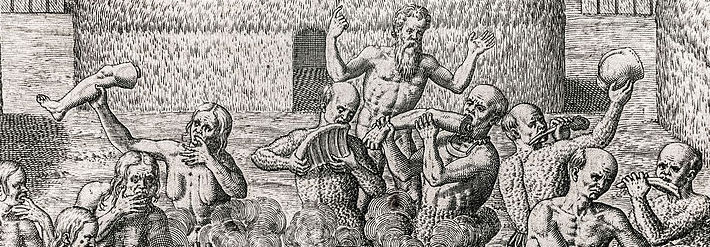—As colonial interests propelled new military exploration and conquests, the Eurocentric view of the world had to confront cultures which until then it knew little or nothing about.—
To finish laying the foundations for a panoramic, critical and renewed overview of science during the sixteenth and seventeenth centuries that does away with the traditional narrative of a supposed Scientific Revolution marked by a handful of heroes (all men, all white, all European) and their great discoveries; perhaps a final effort should be made to decentralise a panorama that has been stated in exclusively European terms. The change of scale required by the first globalisation and the inseparable pairing of modernity and coloniality from Europe to the rest of the planet should also be accompanied by a new global geography of scientific practices. However, this is still to be worked out. This new global geography can only be multi-centric, offering an image closer to that of a complex network of horizontal relationships than to a hierarchy of centres and peripheries that precisely made up the history of science which, until very recently, was deeply marked by the European ethnocentric gaze.
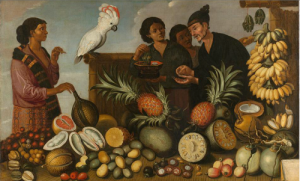
Market in the East Indies, after Albert Eckhout, painted between 1640 and 1666. Wikimedia.
The networks through which knowledge about the world and nature circulated during the first globalisation consisted of very varied relationships (commercial, military, missionary or those exiled for religious or political reasons) and through these flowed a whole arsenal of first-rate scientific information: objects, maps, instruments, reports, descriptions and specimens, as well as food, medicinal remedies, animals, minerals, and people, free or enslaved, with their own knowledge and experience. This huge arsenal of new information circulated, but it was also hidden, accumulated, ordered, analysed, contrasted and put back –or not– into circulation from many centres, not only from the great European metropolises, but also from Acapulco, Macau, Salvador de Bahía, Calcutta, Manila, Malacca and Mexico.
From these and other spaces of a global geography, nature was explored, measured, observed, represented and reproduced, as well as exploited, modified and even destroyed. The knowledge generated through these processes was hybrid, although the hegemonic intercultural appropriation was undoubtedly European, because colonial power was imposed along with its inseparable ally: the discourse of civilising modernity. This knowledge, the result of cultural hybrids, was communicated by various means – some of these new, thanks to the printing press or the emergence of scientific journals – and became more credible through mechanisms that gave value to direct observation, to the elaboration of facts with probative value, thanks to the credibility acquired by certain socially recognised witnesses, just as others were hidden from society or disregarded as unreliable.
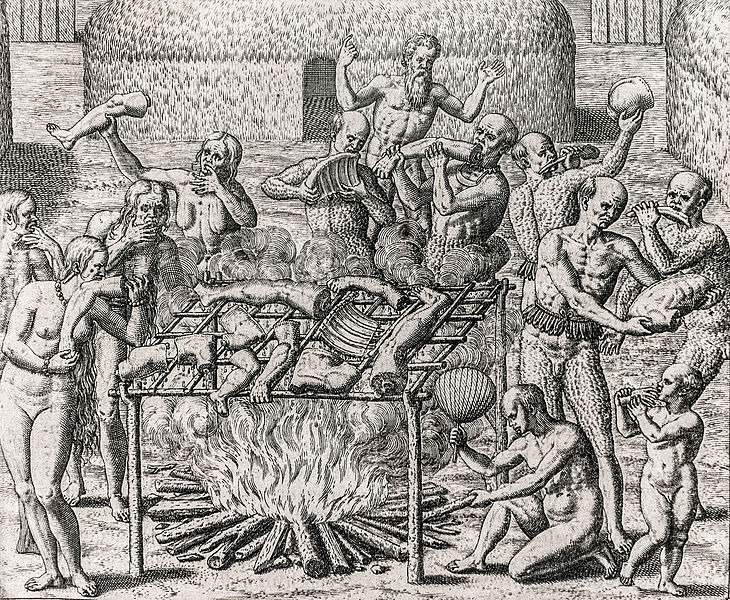
Cannibalism in Brazil, according to an engraving by Theodor De Bry (Frankfurt, 1593). Wikipedia.
In this setting, the colonial power exercised by some European powers exporting their modernity, their Christian religion and their technologies of natural knowledge made it possible to solidly build a discourse of superiority that not only legitimised their gaze towards nature as a whole, but also their particular gaze towards ‘otherness’, towards other non-European human beings. This discourse of ‘the other’ was fostered by various widely disseminated and accepted mechanisms, such as that of turning every inhabitant of the American continent and adjacent islands into cannibals, that of feminising – a form that is not at all subtle in expressing the misogyny of the Eurocentric gaze – the male bodies and minds of both the Eastern and Western ‘Indians’, and, of course, that of animalising or objectifying millions of women and men who had become slaves, to the point of reducing them to a mere commodity.
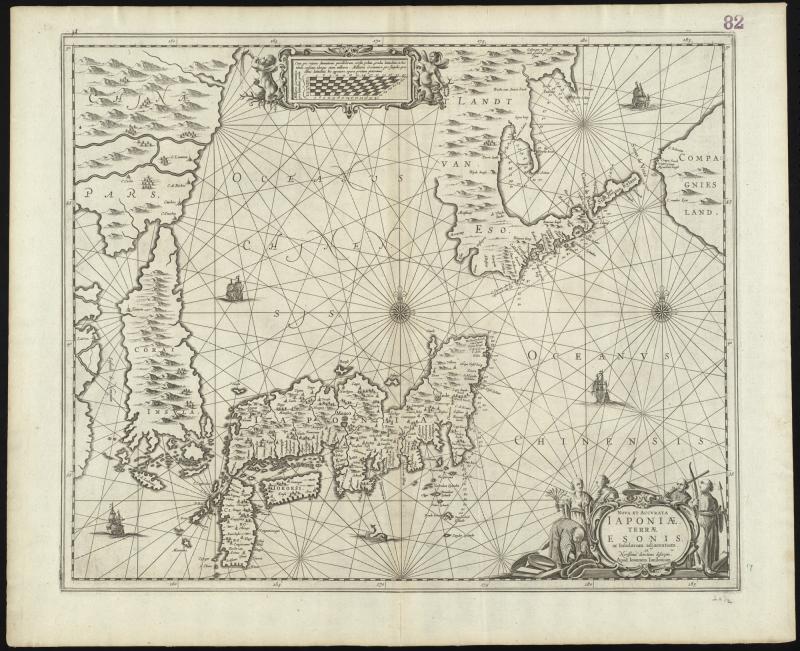
Japan on a European map by Jan Janson (1650). Wikimedia.
Another subtler but equally effective mechanism was what Dipesh Chakrabarty has defined as the asymmetry of ignorance, based on the selective forgetting of what was not known and what was learned from others. A forgetfulness that, as Romain Bertrand has pointed out, is not innocent at all, but is the very condition of what has been taught to be considered, at least implicitly, the innate or acquired superiority of Europe and its knowledge over the rest of the world. In fact, until very recently, the history of science was made up of a single pantheon of great men of modern thought, all indisputably European.

Slave labour in a sugar mill and plants. Anonymous painting on the medical cabinet in the Salvador cabinet (Barcelona, ca. 1750). Institut Botànic de Barcelona.
In recent years, however, the history of science has been able to establish bridges for dialogue with other disciplines from which for much longer there has been continuing reflection on how the parameters of superiority are established, how violence is exercised through the imposition of a certain type of knowledge about the world or how the ignorance of others is built. Anthropologists, philosophers, sociologists and cultural historians have thus contributed to a renewal of the discourse and the topics of inquiry in the history of science. As a result, there is room for in-depth criticism of the way in which European hegemonic knowledge was constituted. The way in which certain knowledge – hitherto considered subordinate, auxiliary or local – was essential to this has been analysed. The process that led to silencing this knowledge, thanks to expropriation/appropriation mechanisms, already formed in the fifteenth and sixteenth centuries from the imperial undertakings of the Portuguese and the Spanish, has also been analysed.
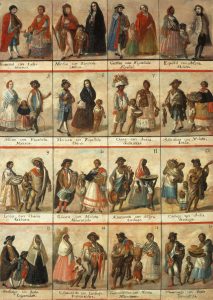
Human taxonomy: the sixteen “castes” in Nueva España. Wikimedia.
The definition of this process ended with the transoceanic expansion of the Dutch, British and French and laid the foundations for the hegemony of European knowledge and a conception of modernity imposed, not without resistance, on the entire planet in our contemporary era, which is yet to be satisfactorily recounted in our present day. Today’s mestizo universe began to take shape in the interactions between those European and non-European societies of that time. If our intention is to create a new geography of the construction of human knowledge about the natural world, space will have to be made for a wider list of areas of contact, intercultural communication, resources, agents, intermediaries and mediators of these contacts. Moreover, at the same time, from this new geography of knowledge, attention must be paid to the way in which colonial power tried to impose its discourse of superiority through these contacts, using mechanisms of the appropriation/expropriation of knowledge, at the same time as imposing the modernity/backwardness disjunctive to judge others. It is an ambitious future programme in which the history of science, at least as practised by the new generations and as it is understood in this Knowledge in action project, has a lot to contribute and a lot to learn.
José Pardo Tomás
IMF-CSIC
How to cite this paper:
Pardo Tomás, José. Europe looks to others. Sabers en acció, 2020-12-18. https://sabersenaccio.iec.cat/en/europe-looks-to-others/.
Find out more
You can find further information with the bibliography and available resources.
Recommended reading
Bertrand, Romain. L’histoire à parts égales. Récits d’une rencontre, Orient-Occident (XVIe-XVIIe siècle). Paris: Seuil; 2011.
Chakrabarty, Dipesh; Bhabha, Homi. Habitations of modernity: essays in the wake of subaltern studies. Chicago: The University of Chicago Press; 2002.
Mignolo, Walter D. Local Histories/Global Designs. Coloniality, Subaltern Knowledges and Border Thinking. Princeton: Princeton University Press; 2000
Raj, Kapil. Relocating Modern Science. Circulation and the Construction of Knowledge in South Asia and Europe, 1650-1900. Basingstoke & New York: Palgrave Macmillan; 2007.
Romano, Antonella. Impressions de Chine : l’Europe et l’englobement du monde (XVIe-XVIIe siècle. Paris: Fayard; 2016.
Studies
Cunningham, Andrew; Williams, Perry. De-Centering the ‘Big Picture’: “The Origins of Modern Science” and the Modern Origins of Science, The British Journal for the History of Science, 1993; 26 (4): 407-432.
Nappi, Carla Suzan. The Monkey and the Inkpot. Natural History and Its Transformations in Early Modern China. Cambridge, Mass.: Harvard University Press; 2009.
Narayan, Uma; Harding, Sandra (ed.) Decentering the center: philosophy for a multicultural, postcolonial, and feminist world. Bloomington: Indiana University Press; 2000.
Sivasundaram, Sujit. Sciences and the Global. On Methods, Questions, and Theory. Isis, 2010; 101 (1): 146-158.
Subrahmanyam, Sanjay. Three Ways to Be Alien. Travails & Encounters in the Early Modern World. Waltham, Mass.: Brandeis University Press; 2011.
Todorov, Tzvetan. Nosotros y los otros: reflexión sobre la diversidad humana. Madrid: Biblioteca Nueva; 2013.

